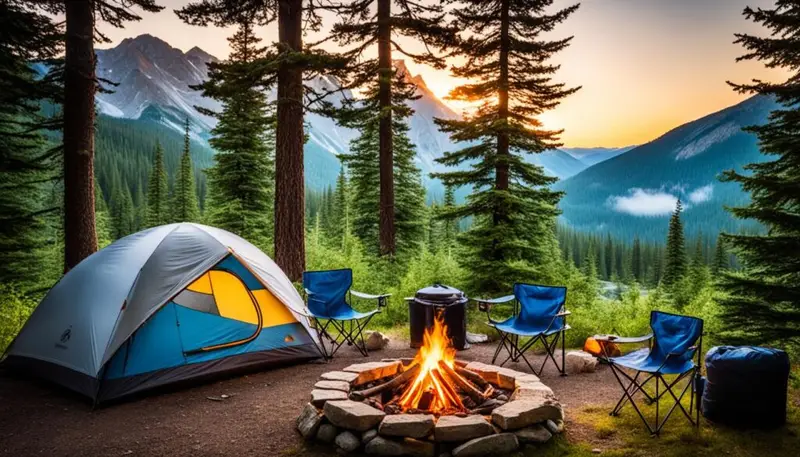
“The wilderness holds answers to more questions than we have yet learned to ask.” – Nancy Wynne Newhall
Camping is a truly transformative experience that allows us to escape the monotony of our daily routines and immerse ourselves in the beauty of nature. Whether you’re seeking adventure, relaxation, or a simple getaway, camping offers endless possibilities for exploration and self-discovery.
If you’re new to camping, embarking on your first outdoor adventure can feel both exhilarating and overwhelming. But fear not! In this comprehensive guide, we will equip you with the essential knowledge and gear you need to embark on a successful camping trip as a beginner.
From choosing the right camping shelter to setting up your tent, practicing camping etiquette, selecting the perfect camping location, and gathering the essential gear, we’ve got you covered. Let us be your guide as you embark on this thrilling journey into the great outdoors.
Key Takeaways:
- Discover the transformative power of camping as you disconnect from the daily grind and connect with nature
- Find out the essential knowledge and gear you need to ensure a successful camping trip as a beginner
- Learn how to choose the right camping shelter, set up your tent, and practice good camping etiquette
- Explore tips for selecting the perfect camping location and gather the essential gear for a comfortable and enjoyable camping adventure
- Get ready to embark on a thrilling journey into the great outdoors and make lasting memories
Choosing the Right Camping Shelter
When embarking on a camping adventure, the first step is to choose the right camping shelter. Tents are a popular choice for beginners due to their portability and adaptability to different weather conditions.
When selecting a tent, there are several factors to consider:
- Your needs: Consider aspects like comfort and space. Are you looking for a cozy shelter or one with more room to move around?
- Weather conditions: Think about the weather you’ll be camping in. Are you expecting rain or strong winds? Opt for a tent that can withstand these conditions.
- Level of experience: If you’re new to camping, a user-friendly and easy-to-pitch tent is ideal. As you gain more experience, you can explore advanced options.
It’s crucial to learn how to pitch a tent correctly to ensure a comfortable stay. Familiarize yourself with the specific instructions for your tent and follow these essential tips:
- Choose a level spot for your tent’s setup.
- Pay attention to tent stakes and use them properly to secure your shelter.
- Add a tarp underneath your tent for extra protection against moisture.
- Improve airflow and insulation inside your tent for a more comfortable experience.
In addition to tents, there are other lodging options available such as cabins and RVs, which offer more comfort and convenience. These alternatives may be suitable for campers who prefer certain amenities during their outdoor getaway.
For a visual representation of different camping shelters, take a look at the comparison chart below:
| Camping Shelters | Pros | Cons |
|---|---|---|
| Tents | Portable, adaptable to different conditions | Less comfort and limited space |
| Cabins | More comfort, amenities available | Less connection with nature |
| RVs | Ultimate comfort and convenience | Requires driving and parking space |
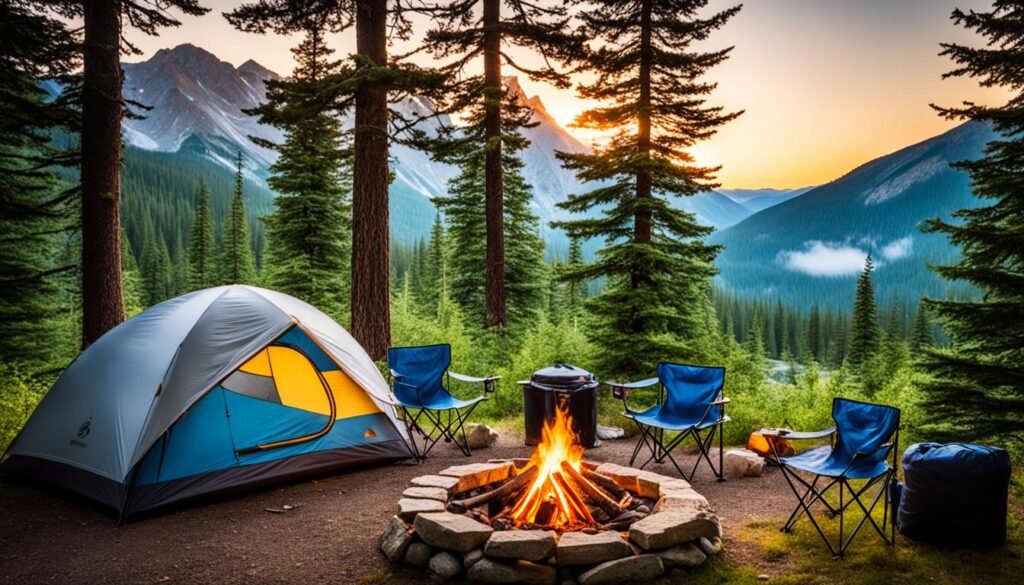
Setting Up Your Tent
Setting up your tent correctly is essential for a successful camping trip. Different types of tents require different assembly techniques, so it’s important to familiarize yourself with the specific instructions for your tent. Here are some general tips for pitching a tent:
- Choose a level spot: Look for a flat area free from rocks, roots, and other debris. This will ensure a more comfortable sleeping surface and prevent any discomfort or damage to your tent.
- Be mindful of tent stakes: Properly secure your tent by using stakes to anchor it to the ground. Make sure the stakes are fully inserted and consider using extra stakes for added stability in windy conditions.
- Use a tarp for extra protection: Place a waterproof tarp under your tent to provide an additional layer of protection from moisture and to help extend the lifespan of your tent.
- Add airflow and insulation: To make your tent more comfortable, consider opening vents for airflow during warmer weather or using a tent fan. In colder conditions, insulate the floor with a footprint or extra blankets for added warmth.
By following these tips, you can ensure that your tent is secure and comfortable for your camping adventure.
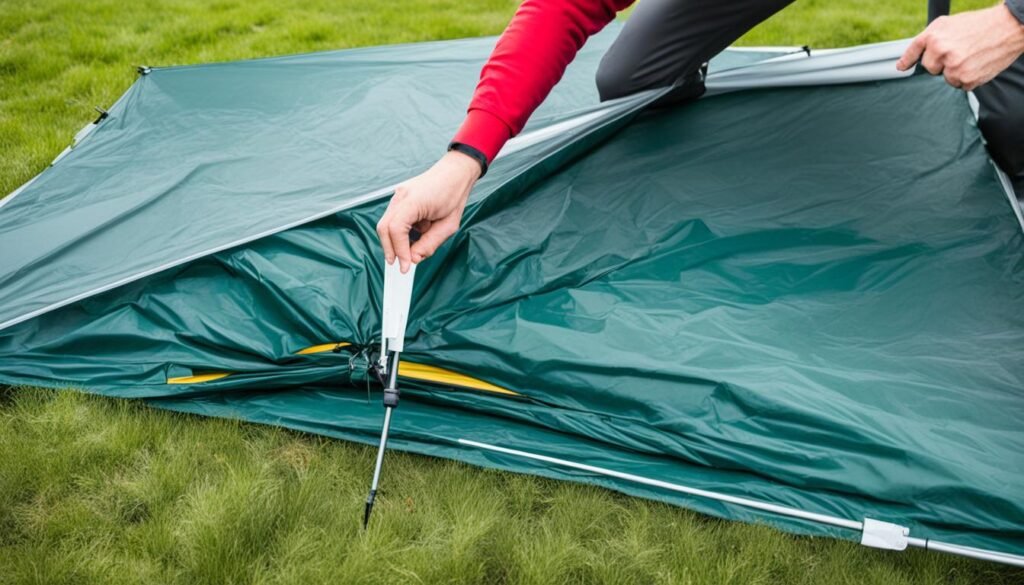
Camping Etiquette
At our campsite, we believe that practicing good camping etiquette is the key to a positive outdoor experience for everyone. Following a few simple guidelines can help ensure a harmonious camping environment and preserve the natural beauty of the outdoors for future campers.
Respect Quiet Hours
During camping trips, it’s important to be mindful of quiet hours to allow everyone to enjoy a peaceful camping experience. Respect the designated quiet hours at the campground and keep noise levels to a minimum. This includes refraining from loud conversations, playing music at a high volume, or using noisy equipment during the designated quiet hours.
Keep Your Campsite Clean and Organized
Keeping our campsite clean and organized is not only a matter of courtesy but also contributes to the overall camping experience. Dispose of trash properly in designated bins or, if necessary, take it with you when you leave. Packaging, leftover food, and any other waste should not be left behind. In addition, keep your camping gear and personal belongings organized within your campsite to ensure a tidy and clutter-free environment.

Follow the Principles of Leave No Trace
As responsible campers, it’s essential to follow the principles of Leave No Trace to minimize our impact on the environment. These principles include:
- 1. Pack it in, pack it out: Take all your trash and waste with you when you leave, leaving no trace behind.
- 2. Minimize campfire impact: Follow the campground’s rules for campfires, use designated fire rings, and fully extinguish the fire before leaving.
- 3. Respect wildlife: Observe wildlife from a distance, avoid feeding or approaching them, and do not disturb their habitats.
- 4. Stay on designated trails: Stick to established trails to minimize erosion and avoid damaging fragile ecosystems.
- 5. Be considerate of other visitors: Respect other campers’ privacy and avoid shining lights or making loud noises that may disturb their experience.
By adhering to these principles, we can contribute to the preservation and protection of the natural environment we enjoy during our camping adventures.
Be Mindful of Other Campers
While camping, it’s important to be considerate of other campers and their camping experience. Avoid shining lights directly towards other campsites, as it can disrupt their ambiance and privacy. Keep conversations and noise levels at an appropriate volume to minimize disturbances. By being mindful of others, we can foster a sense of community and create a welcoming camping environment for everyone.
Remember, practicing good camping etiquette not only enhances your own outdoor experience but also ensures that others can enjoy their time in nature. Let’s all do our part to create a respectful, clean, and harmonious camping environment for everyone.
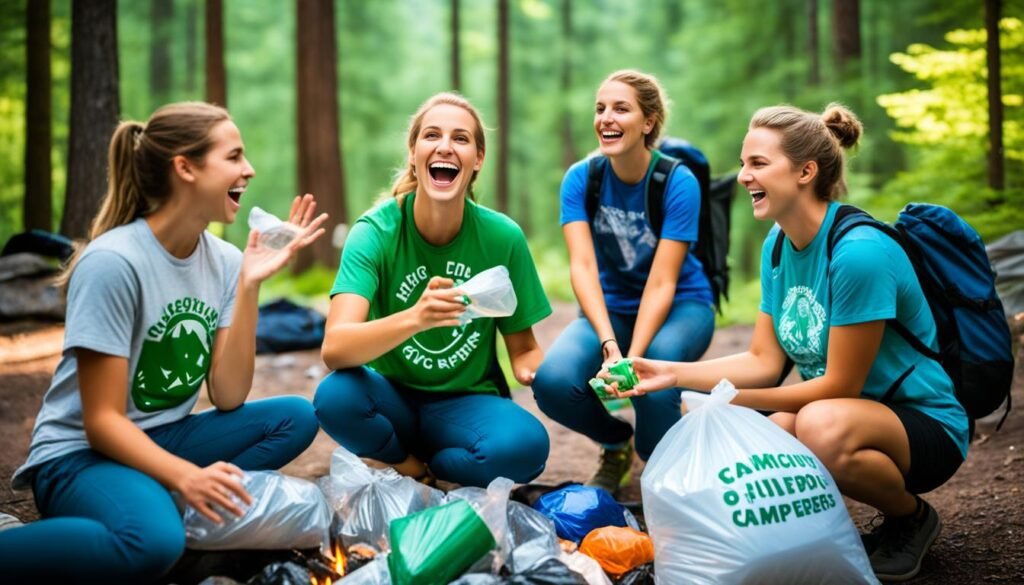
Selecting a Camping Location
Choosing the right camping location is crucial for a successful camping trip. As beginners, it’s important to consider factors such as your goals for the trip, the season and weather conditions, and the accessibility of the campsite. By carefully selecting your camping location, you can ensure an enjoyable and fulfilling camping experience.
When deciding on a camping location, take into account what you hope to get out of your trip. Are you looking for a relaxing getaway or an adventure-packed experience? Consider the activities and attractions available in the area, such as hiking trails, fishing spots, or scenic viewpoints.
The season and weather conditions also play a significant role in choosing a camping location. Some campsites may be more suitable for certain times of the year, while others may offer year-round camping opportunities. Research the climate and average temperatures of the area and make sure to pack accordingly.
Another important aspect to consider is the accessibility of the campsite. If you’re new to camping, it may be easier to choose a location that is closer to home. This allows for a convenient and easy trip, giving you the opportunity to test out your gear and camping skills without being too far away from familiar surroundings.
On the other hand, if you’re up for an adventure and want to explore new places, you can venture further away from home. Look for popular camping destinations such as state and national parks, private campgrounds, or scenic natural areas. These locations often offer a range of amenities and activities tailored to the needs of campers.
Remember, the key is to choose a camping location that aligns with your preferences and experience level. Whether you opt for an easy trip close to home or a more adventurous journey further away, the most important thing is to enjoy the great outdoors and create lasting memories.
Continue reading to discover the essential camping gear you’ll need for your adventure.
Essential Camping Gear for Beginners
To have a successful camping trip, it’s important to have the right gear. As beginners, it can be overwhelming to know what essentials to pack for your camping adventure. That’s why we’ve put together a beginner camping checklist to help you get started on the right foot. By having these essential items, you’ll be well-prepared and ensure a comfortable and enjoyable trip.
Camping Essentials Checklist
| Item | Description |
|---|---|
| Tent | A durable and weather-resistant tent to protect you from the elements |
| Sleeping bags | Warm and comfortable sleeping bags to keep you cozy at night |
| Sleeping pads | Insulated sleeping pads for added comfort and insulation from the ground |
| Camping pillow | A compact and comfortable pillow for a good night’s sleep |
| Headlamps or flashlights | Hands-free lighting for nighttime activities and exploring |
| Camp chairs | Portable chairs for relaxing around the campfire |
| Camp table | A sturdy table for cooking and dining |
| Lantern | A bright source of light for your campsite |
| Cooking stove | A portable stove for cooking meals |
| Cookware and utensils | Pots, pans, and utensils for preparing and serving meals |
| Cooler | A cooler to keep food and drinks cold |
| First-aid kit | A well-stocked kit with essential medical supplies |
In addition to these camping essentials, it’s important to dress appropriately for the weather and bring toiletries, sun and bug protection, and any necessary medications. Being prepared with the right gear will make your camping experience more enjoyable and stress-free. So pack your bags, gather your gear, and get ready to embark on an unforgettable camping adventure!
Conclusion
In conclusion, camping is an excellent opportunity for beginners to connect with nature and embark on a memorable outdoor adventure. To ensure a successful camping trip, it is crucial to have basic knowledge and essential gear. By carefully selecting the right camping shelter, setting up the tent correctly, practicing good camping etiquette, choosing a suitable camping location, and having the necessary gear, beginners can be well-prepared for their camping experience.
Remember to fully immerse yourselves in the beauty of the outdoors and adhere to safety guidelines to make the most of your camping journey. Whether you prefer a serene retreat or an action-packed excursion, camping provides endless opportunities to create lasting memories. So, gather your gear, discover new destinations, and embrace the joy of camping. Happy camping!
Before concluding, take a few minutes to visit our partner store related to outdoor activities!
FAQ
What are some essential camping tips for beginners?
As a beginner camper, it’s important to start with some basic knowledge and essential gear. You should choose the right camping shelter, set up your tent correctly, practice good camping etiquette, select a suitable camping location, and have the essential gear. By following these tips, you’ll be well-prepared for your camping adventure.
What are some popular choices for camping shelters?
Tents are a popular choice for beginners because they are portable and adaptable to different weather conditions. However, cabins and RVs may be suitable for those who prefer more comfort and convenience during their camping trip.
How do I set up a tent correctly?
Different types of tents require different assembly techniques, so it’s important to familiarize yourself with the specific instructions for your tent. Some general tips for pitching a tent include choosing a level spot, being mindful of tent stakes, using a tarp for extra protection, and making your tent more comfortable by adding airflow and insulation.
What is camping etiquette?
Camping etiquette refers to the guidelines and behaviors that campers should follow to ensure a positive camping experience for themselves and others. This includes being respectful of quiet hours, keeping your campsite clean and organized, and following the principles of Leave No Trace. It’s important to be mindful of other campers and avoid shining lights towards their campsites.
How do I choose a camping location?
When selecting a camping location, it’s important to consider your goals for the trip, the season and weather conditions, and the accessibility of the campsite. Depending on your preferences and experience level, you may choose to camp close to home for a convenient and easy trip or venture further away for new experiences. Factors such as state and national parks, private campgrounds, and scenic natural areas should be taken into account.
What gear do I need for camping as a beginner?
Some essential camping gear for beginners includes a tent, sleeping bags, sleeping pads, camping pillow, headlamps or flashlights, camp chairs, camp table, lantern, cooking stove, cookware, utensils, cooler, and a first-aid kit. It’s also important to dress appropriately for the weather and bring toiletries, sun and bug protection, and any necessary medications.
Source Links
- https://koa.com/blog/a-beginners-guide-to-camping-for-the-first-time/
- https://gearjunkie.com/camping/beginner-camping-gear-essentials-checklist
- https://www.rei.com/learn/expert-advice/family-camping-checklist.html
The Baffls Team (info@baffls.com)
Follow Us on https://www.Baffls.com (Facebook – Twitter/X)
#camping101 #beginnercampers #outdoornovices
Disclosure: This post contains affiliate links. If you make a purchase through these links, I may earn a commission at no additional cost to you. We only recommend products or services that I personally use and believe will add value to my audience. Your support helps keep this content free for everyone. Thank you for your support!
Prices and discounts noted at the time of publication Monday April 8, 2024. They may have been changed without notice by the retailer at the time you view this page.



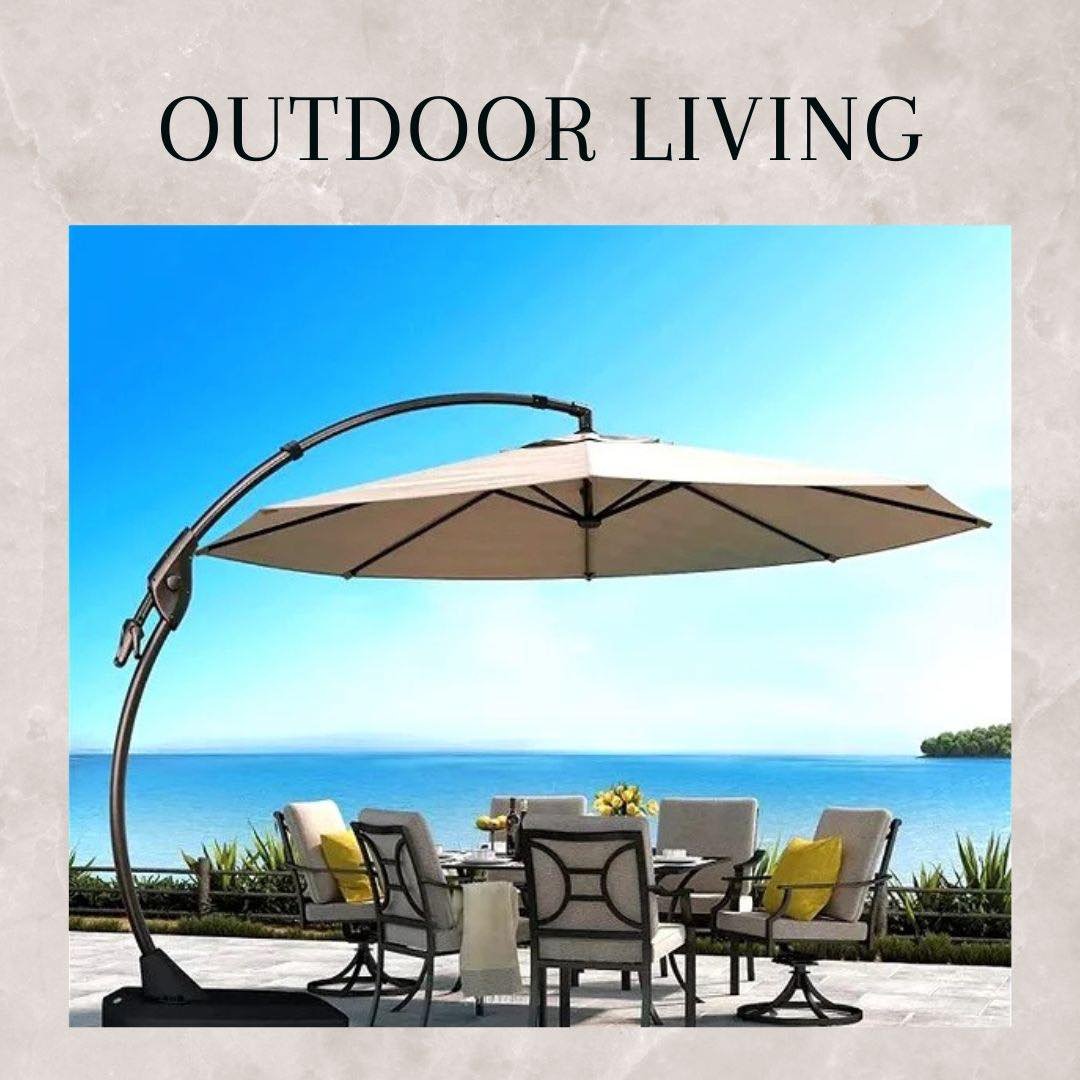
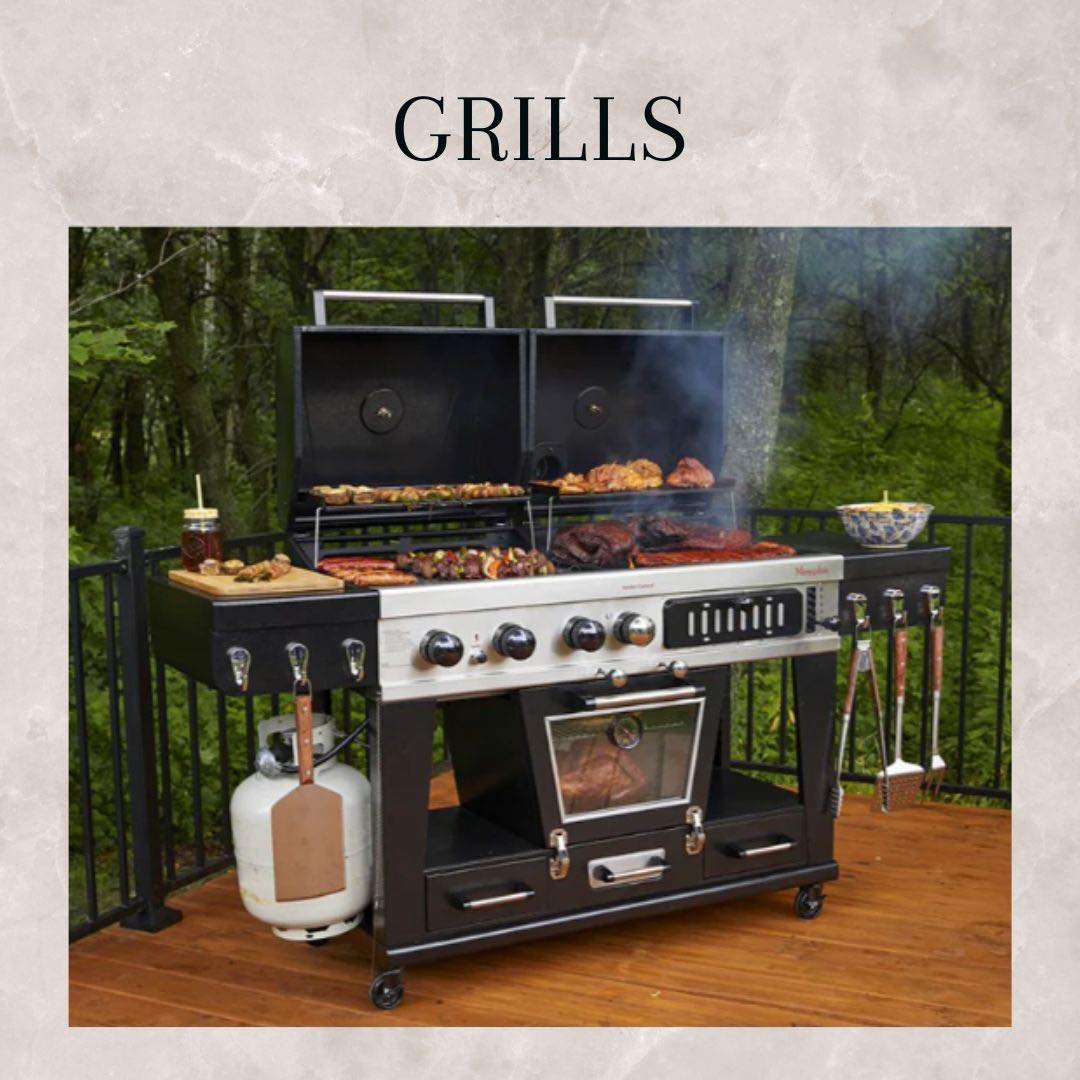




This article is fantastic! It’s detailed, well-researched, and presented in a way that’s easy to understand. I really enjoyed reading it
Thanks for the comment and continue to follow us on Baffls.com for more articles!
! It’s informative, well-written, and really easy to follow. The author’s expertise shines through
Thanks for the comment and continue to follow us on Baffls.com for more articles!